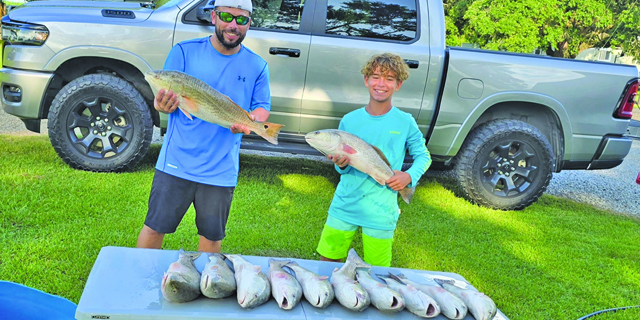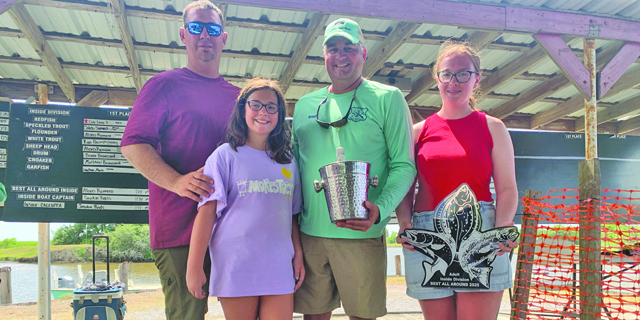Is the doctor right?
Published 5:00 am Sunday, October 8, 2017

- The colorful portrait of Donald A. Pavy MD that hangs in the 1919 structure where he has practiced medicine since 1959, is symbolic of the stories he tells of family members and his own life as a family doctor in rural Iberia Parish.
Still in practice, Pavy’s passion is diagnosing a famed murder
Trending
More than one person over the course of a year suggested a story on the potentially oldest practicing doctor in South Louisiana. Observing him at various community events, he is always engaged in conversation.
The idea of learning how a man passes retirement age and still sees patients at 86 years of age was intriguing. Finally sitting down with Donald A. Pavy MD took the interview in an unexpected direction and smack into the middle of one of the most controversial political slayings in Louisiana history.
The Passions of Dr. Pavy
As a platform for the story that follows, a glimpse into his Iberia Parish roots is provided for those who aren’t familiar with the man. Receiving his license to practice in 1954, Donald A. Pavy MD was practicing on Weeks Island by 1959. He remained there until the island closed offering to move people, house and all, to new locations. For Pavy that meant a house into New Iberia and his medical practice — building and all — to Lydia. There since 1969 he still practices.
“He has been the only physician presence in the Lydia area for 62 years,” said Camille Pavy Claiborne, Pavy’s niece and healthcare professional. “He thrives as a family doctor serving all age groups. Patients are definitely his passion.”
Quick to tell you, he is one of 10 siblings, has 20 uncles and aunts, 60 first cousins, 40 nieces and nephews, hundreds of cousins in various degrees. All were professionals, 17 doctors, 20 lawyers, judges, politicians, two biomedical engineers, several nurses — a collected education from more than 50 higher learning institutions in almost as many states.
Trending
He is passionate about his family and Pavy is very eager to tell their stories — much quicker than his own. Moving onto any subject other than the family legacy, it was easy to see he had many stories to tell. One rose to the top for today’s feature.
As Claiborne explained, he couldn’t and wouldn’t tell you about his patients for ethical reasons. The next best thing, and a close second to his love for his patients, has been clearing the family name, she said.
Long Way Around the Tale
Not until Claiborne filled in the gaps did the story that fascinated this writer in a fast paced interview bring Dr. Pavy into relationship with the assumed innocent, but judged guilty, in the shadows of Louisiana politics. Pavy’s interest in the subject of who shot Huey Long is not idle curiosity, but reckoning a wrong that blemished the family honor during his early childhood.
Recounting the history in the Pavy and Weiss families, Pavy held the book he wrote in hand flipping to familiar sections and showing pictures as he explained the logic behind the opinion he and others in the family hold of his cousin’s husband’s innocence. He wrote in chapter one the reason his passion has remained integral to his life.
“The earliest recollection I have of any event in my entire life was when I was four years old. It was the day after Huey Long was shot. I was leaving my grandmother’s home when I heard the adults in the car talking about the shooting. Our family was involved, I learned, but I didn’t exactly understand in what way or know the details,” Pavy wrote.
Pavy published his book in 1999 on the subject, “Accident and Deception The Huey Long Shooting.” Testimonies from eyewitness accounts he uncovered mirror the infamous tradition of Louisiana dirty politics. The evidence was never allowed until the deception was permanently embedded in the minds of Louisiana students for generations and recorded history.
One fact remains from the day of Long’s shooting, in Pavy’s opinion. Carl Austin Weiss Sr. was shot in cold blood as the person who shot and killed Huey Long. Though the mystery remains, Pavy is convinced.
The family secret of Weiss’ innocence needing to be revealed has become a magnificent obsession. Weiss was married to Yvonne Louise Pavy the daughter of Judge Benjamin Henry Pavy — Dr. Pavy’s uncle. His brother, the late Judge Henry Garland Pavy, was privy to much information and assisted in compiling the published book.
“Uncle Donald wanted to right the wrong. He wanted the name Pavy cleared,” Claiborne said. “When he kicked off the book in Baton Rouge, he had one of the nurses from Long’s surgery team at the signing.”
As the concluding comment in the book’s introduction, Pavy said, “If there is a place for justice in this world, history may have to be revised to record the truth about the death of Huey Long. That is why ‘Accident and Deception’ was written, and this is my story.”
One Man’s Recall Silenced
One of the eye witnesses feared for his life, Pavy said, and that of his family long after the event. Pavy’s research for the book brought letters from people touched by the tragedy but unable to speak about the shooting at the time. Portions are repeated herein for clarity rather than direct quotes from the interview.
The following is from a close friend of a reporter who was on the scene the day Long was shot. Vernon McGee’s recollection to his confidant indicates he may have had the most accurate perspective. With mortality now separating him from the events, McGee’s story can be told.
“Various reporters for the wire services, including McGee, were following Long around. As the group … this included Long, some staff, and a group of state police bodyguards … went down the hall with the governor in the lead … everyone stopped since a man (Carl Austin Weiss) came up to speak with Long. McGee says Long brushed off the man and rudely pushed him away. As he did so the bodyguard immediately in front of McGee pulled his side arm and it hung in the holster. When he jerked it free it cocked, fired and, to McGee it appeared to hit Long in the back … sort of the kidney area.
“McGee says it was obvious the young man did not plan to fire, but only to have his side arm ready. When he did fire, that shot caused the other bodyguards to shoot at the person pushed back by Long. He was killed and the reporters were kept back away from the body. McGee thought the man was unarmed since he never saw a gun or did he see or hear any threat. It seemed to him the fellow was just trying to talk with Long.
“In a matter of minutes the head of the state police appeared and made it very clear that there had been an assassination attempt on Long and the bodyguards had killed the assassin and they wanted no change in that story or there would be serious consequences. McGee never did detail what they were, but only indicated life was at state,” said Pavy’s book of the letter written by McGee’s friend, Aris A. Mallas.
McGee’s viewpoint was not the only inconsistency in the official record exposed in Pavy’s book. Brother of the slain accused assassin, Dr. Ted Ed Weiss, wrote Pavy his observations on that day only hours after the incident. Bodyguard accounts, medical evidence — which Pavy could verify as a professional diagnostician — all contradicted the hurried civilian verdict and rapid-fire judgment. Pavy said he spoke with surgical nurses that were part of the attending medical staff for Long. Their observations disputed the stories being fabricated, Pavy said.
There was no treating Carl Austin Weiss. His life was ended prematurely and the scandal affected his family’s life forever.
Long Time Coming
At the conclusion of the evidential writings, Pavy said, “For decades the Pavy and Weiss families have lived in the shadow of claims that there was a plot to assassinate Huey Long. In particular, I wish the light of truth to shine on brother Dr. Tom Ed Weiss, now an old man, who has spent much of his life trying to exonerate his brother. He knew full well that someone other than his neat and meticulous brother had taken the .32-caliber gun from his car that fateful evening of Sept. 8, 1935.”
The family suspected Weiss’ gun was planted near his body after the shooting, Pavy said. His car, spotted near the steps of the state capital by the brother within an hour of the shooting, had been moved and his gun, usually carried in the glove compartment, was missing in an uncharacteristic manner. The book gives logical explanations of Pavy’s theory.
The final comment in the original text, pre-epilogue, is a quote found among the papers of Monseigneur Ronald Knox, a scholar and writer who wrote the Knox translation of the Bible. “What I have written does not belong to me. If I have written the truth, then it is ‘God’s truth.’ It would be true if any human mind denied it, or if there were no human minds in existence to recognize its existence.”
The debate over who shot Huey Long may never be reconciled or justified to the extent the law should have provided in a day when manipulations were at their strongest in Louisiana politics. But for a country doctor who has served his community for more than 62 years, it’s time to set the record straight exposed in a public manner that includes uploading to the World Wide Web. With an Internet search of family names, the seed of redemption is there for all to see. Thus, Pavy’s story about Weiss is told even if only in part.
The out-of-print book is available on Amazon.com Kindle with additional material discovered after the first and only printing of “Accident and Deception The Huey Long Shooting,” by Donald A. Pavy MD. He has also written about his life on Weeks Island in “Alligators, Marshes, Mining, and Medicine” and gives practical health advice in “Common Sense Medicine,” also out of print.





